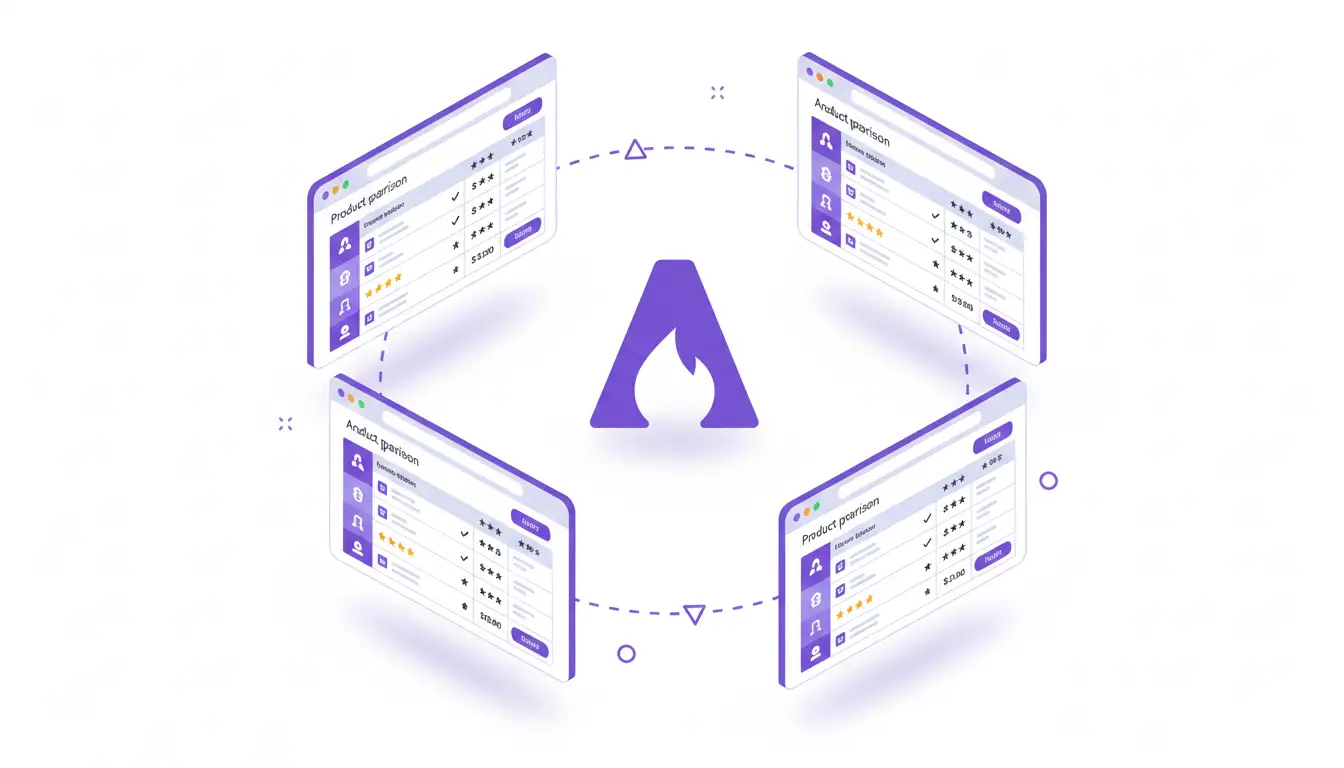
Product comparison tables are one of the most effective ways to help readers choose between different products—and they’re proven to increase affiliate conversions. In AstroPress, you can create stunning comparison tables without any coding or complex plugins.
In this guide, I’ll show you how to use AstroPress’s built-in comparison block to create professional product comparison tables that convert.
Why Product Comparison Tables Work
Before we dive into the technical details, let’s talk about why comparison tables are so powerful:
- Instant clarity - Readers see all options side-by-side
- Easier decisions - Clear feature comparisons help readers choose
- Higher conversions - When readers understand the value, they’re more likely to buy
- Better SEO - Google loves structured comparison content
Comparison Table Example 1: Blogging Tools
Let’s start with a basic comparison showing our top blogging tools:
Best Blogging Tools Comparison

AstroPress Pro Theme
Key Features
- 30+ Dark & Light Themes
- Built-in SEO Tools
- Affiliate Blocks Included
- Zero Database Required
✓ Pros
- • Blazing fast performance
- • No WordPress complexity
- • Built-in monetization
✗ Cons
- • Requires basic Git knowledge
- • Not drag-and-drop
- • Learning curve for non-developers

SEO Toolkit for Bloggers
Key Features
- Keyword Research Templates
- Content Optimization Checklist
- Link Building Strategies
- Google Analytics Setup Guide
✓ Pros
- • Actionable strategies
- • Beginner-friendly
- • Lifetime updates
✗ Cons
- • Digital download only
- • No video tutorials
- • US-focused examples

90-Day Content Planner
Key Features
- 90-Day Editorial Calendar
- Topic Research Framework
- Publishing Workflow System
- Performance Tracking Sheet
✓ Pros
- • Easy to customize
- • Google Sheets compatible
- • Proven framework
✗ Cons
- • Requires spreadsheet knowledge
- • No mobile app
- • Manual updates needed
How to create this:
<ComparisonBlock id="blogging-tools-comparison" />
This comparison helps readers quickly see the differences between AstroPress Pro, our SEO Toolkit, and the Content Planner. The side-by-side layout makes it easy to compare prices, features, and ratings.
Comparison Table Example 2: Monetization Essentials
Here’s a comparison focused on monetization tools—perfect for bloggers ready to start earning:
Blog Monetization Essentials

Blog Monetization Masterclass
Key Features
- 12 Hours of Video Content
- Affiliate Marketing Templates
- Ad Network Setup Guides
- Private Community Access
✓ Pros
- • Comprehensive curriculum
- • Real-world case studies
- • Active community support
✗ Cons
- • Higher price point
- • Time commitment required
- • No refunds after 30 days

SEO Toolkit for Bloggers
Key Features
- Keyword Research Templates
- Content Optimization Checklist
- Link Building Strategies
- Google Analytics Setup Guide
✓ Pros
- • Actionable strategies
- • Beginner-friendly
- • Lifetime updates
✗ Cons
- • Digital download only
- • No video tutorials
- • US-focused examples

AstroPress Pro Theme
Key Features
- 30+ Dark & Light Themes
- Built-in SEO Tools
- Affiliate Blocks Included
- Zero Database Required
✓ Pros
- • Blazing fast performance
- • No WordPress complexity
- • Built-in monetization
✗ Cons
- • Requires basic Git knowledge
- • Not drag-and-drop
- • Learning curve for non-developers
How to create this:
<ComparisonBlock id="monetization-essentials" />
Notice how this comparison groups products by their purpose (course, tools, platform). This helps readers understand which products work together to create a complete monetization strategy.
Comparison Table Example 3: Beginner Bundle
For beginners, sometimes less is more. Here’s a simple 2-product comparison:
Beginner Blogger Starter Bundle

AstroPress Pro Theme
Key Features
- 30+ Dark & Light Themes
- Built-in SEO Tools
- Affiliate Blocks Included
- Zero Database Required
✓ Pros
- • Blazing fast performance
- • No WordPress complexity
- • Built-in monetization
✗ Cons
- • Requires basic Git knowledge
- • Not drag-and-drop
- • Learning curve for non-developers

90-Day Content Planner
Key Features
- 90-Day Editorial Calendar
- Topic Research Framework
- Publishing Workflow System
- Performance Tracking Sheet
✓ Pros
- • Easy to customize
- • Google Sheets compatible
- • Proven framework
✗ Cons
- • Requires spreadsheet knowledge
- • No mobile app
- • Manual updates needed
How to create this:
<ComparisonBlock id="beginner-blogger-bundle" />
This focused comparison is perfect for beginners who might feel overwhelmed by too many options. Just the essentials: a theme and a content planner.
Comparison Table Example 4: Complete Professional Toolkit
And for serious bloggers, here’s a comprehensive comparison with all four products:
Professional Blogger Complete Toolkit

AstroPress Pro Theme
Key Features
- 30+ Dark & Light Themes
- Built-in SEO Tools
- Affiliate Blocks Included
- Zero Database Required
✓ Pros
- • Blazing fast performance
- • No WordPress complexity
- • Built-in monetization
✗ Cons
- • Requires basic Git knowledge
- • Not drag-and-drop
- • Learning curve for non-developers

Blog Monetization Masterclass
Key Features
- 12 Hours of Video Content
- Affiliate Marketing Templates
- Ad Network Setup Guides
- Private Community Access
✓ Pros
- • Comprehensive curriculum
- • Real-world case studies
- • Active community support
✗ Cons
- • Higher price point
- • Time commitment required
- • No refunds after 30 days

SEO Toolkit for Bloggers
Key Features
- Keyword Research Templates
- Content Optimization Checklist
- Link Building Strategies
- Google Analytics Setup Guide
✓ Pros
- • Actionable strategies
- • Beginner-friendly
- • Lifetime updates
✗ Cons
- • Digital download only
- • No video tutorials
- • US-focused examples
How to create this:
<ComparisonBlock id="pro-blogger-toolkit" />
This is your ultimate comparison table—showing readers exactly what they get with each product and how they all work together to build a professional blog.
How to Set Up Your Comparison Tables
Creating comparison tables in AstroPress is simple. You need to create a comparison JSON file in /src/content/data/affiliate-comparisons.json:
{
"id": "your-comparison-id",
"title": "Comparison Title",
"description": "Brief description of what you're comparing",
"products": [
"product-1-id",
"product-2-id",
"product-3-id"
],
"category": "your-category",
"active": true
}
Step-by-Step Setup:
- Create your products - First, make sure all your products exist in
/src/content/data/products/ - Create the comparison - Add a new entry to
affiliate-comparisons.json - Use in your article - Add
<ComparisonBlock id="your-comparison-id" />anywhere in your MDX file
That’s it! AstroPress handles all the styling, responsive design, and structured data automatically.
Best Practices for Comparison Tables
Here are some tips to make your comparison tables more effective:
1. Compare Similar Products
Don’t compare apples to oranges. Your comparison should help readers choose between similar options, not confuse them with unrelated products.
2. Include 2-4 Products Maximum
Too many options lead to decision paralysis. Keep it focused:
- 2 products: Direct head-to-head comparison
- 3 products: Good/better/best options
- 4 products: Comprehensive comparison for different needs
3. Highlight Key Differences
Make sure your product descriptions emphasize what makes each one unique. Why would someone choose Product A over Product B?
4. Use Clear Pricing
Show both regular and sale prices when available. Transparency builds trust.
5. Add Context
Don’t just drop a comparison table without explanation. Tell readers:
- What they’re comparing
- Who each product is best for
- Your personal recommendation
When to Use Comparison Tables
Comparison tables work best in these types of content:
- “Best [Product] for [Year]” articles
- Product roundup posts
- Beginner’s guides comparing starter options
- Budget vs. Premium comparisons
- Complete setup guides showing all necessary tools
Comparison Tables vs. Individual Product Blocks
You might wonder: when should I use a comparison table versus individual product blocks?
Use Comparison Tables when:
- Readers need to choose between 2-4 similar products
- You’re showing package deals or bundles
- Price is an important decision factor
- You want readers to compare features side-by-side
Use Individual Product Blocks when:
- You’re doing an in-depth review of one product
- You want to showcase product features in detail
- The product needs its own dedicated section
- You’re telling a story about how you use the product
Why AstroPress Comparison Tables Are Better
Here’s why AstroPress comparison tables beat WordPress alternatives:
✅ No plugins needed - Built right into the system ✅ Lightning fast - No heavy JavaScript or database queries ✅ Mobile responsive - Looks perfect on all devices ✅ SEO optimized - Structured data included automatically ✅ Easy updates - Change one JSON file to update all comparisons ✅ Multiple designs - The comparison block adapts to any theme ✅ Conversion optimized - Designed to drive clicks and sales
Real-World Example: My Monetization Strategy
Let me show you how I use comparison tables on my own blog. When someone lands on my “How to Start a Blog” guide, I use:
- Individual ProductBlock for my #1 recommendation (AstroPress Pro)
- Comparison table showing the complete starter bundle
- Another comparison table for monetization tools
This approach guides readers through the decision-making process without overwhelming them.
Start Using Comparison Tables Today
Product comparison tables are one of the easiest ways to boost your affiliate earnings. They help readers make better decisions, build trust in your recommendations, and increase click-through rates.
With AstroPress, you don’t need any coding skills or expensive plugins. Just create your comparison JSON file, add the block to your article, and you’re done.
Ready to start? Pick 2-3 products from your niche, create a comparison, and watch your conversion rates improve!


